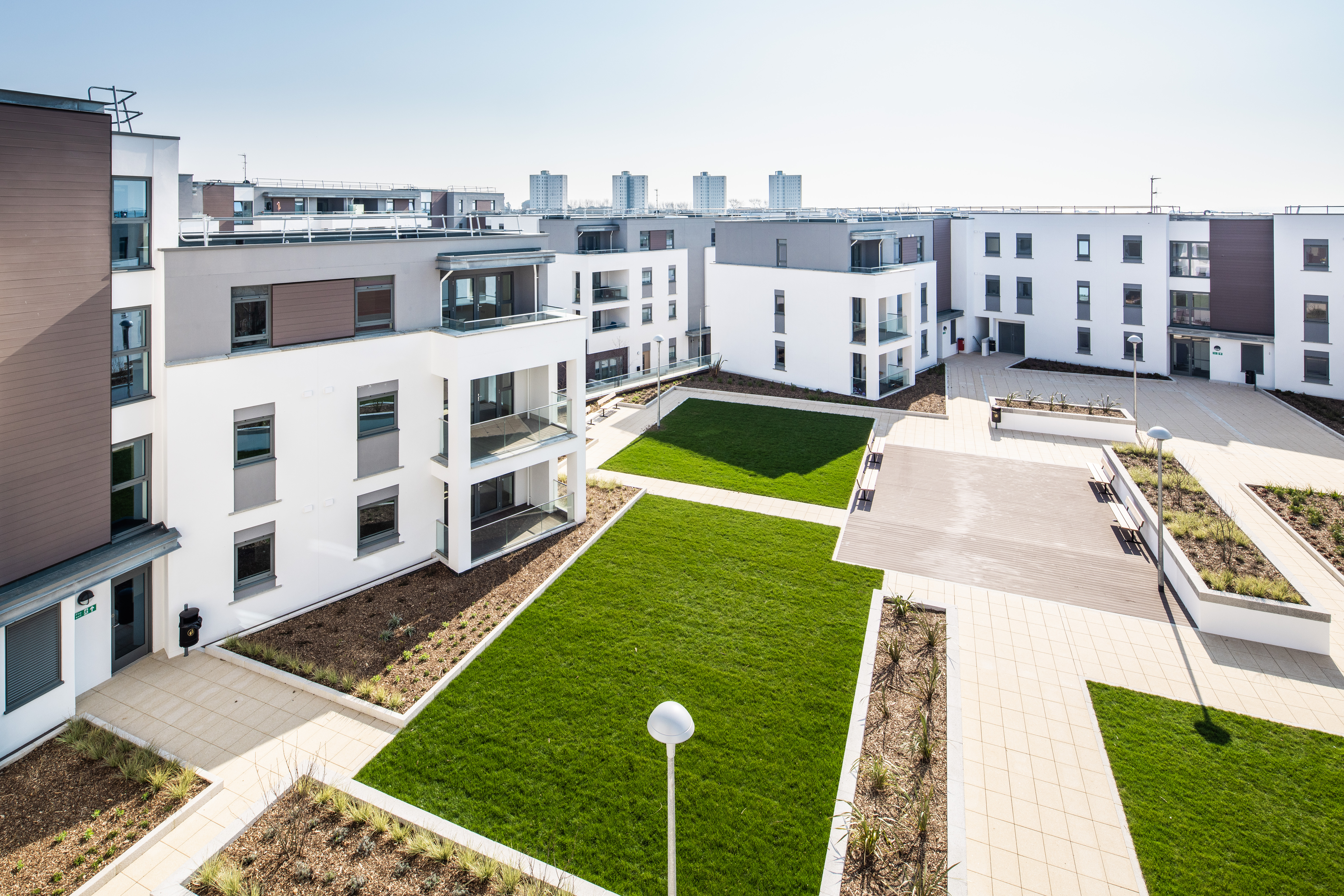Le Clos Mourant Social Housing - Triflex (UK) Ltd
Project
Le Clos Mourant Social Housing
Product
Triflex ProTerra Buried HD / Triflex ProTect Warm Roof
Size (M2)
9850m2
Contractor
Rateavon Jersey Ltd
Winner
LRWA Awards 2023
Liquid Roofing Project in a Buried Application

- The Background
The Le Clos Mourant social housing development in Jersey delivers 151 modern accommodation blocks innovatively designed to deliver considered accommodation that embraces community. Triflex provided a coherent approach to waterproofing the many areas including provision of waterproofing systems for warm flat roofs, warm balconies and podiums, as well as systems for cantilevered balconies, stairs and entrance canopies.
- The Challenge
Le Clos Mourant housing estate in St Clement, Jersey is a major regeneration project, creating mixed tenure accommodation built on the site of previous rental homes that were demolished in 2009.
The site consists of four blocks with 151 units of accommodation, completed in 2022. Each of the 16 one-bedroom apartments, 46 two-bedroom apartments and 89 three-bedroom apartments have a private outdoor space, with generous balconies on upper floors. Block A is the smaller block with a communal garden and three larger blocks B, C and D each incorporate a large central podium designed to generate a community space. The site is located opposite the Le Squez Samarès Primary School and next to the Florence Boot Fields running track. The creation of long views between blocks creates an open feel befitting to the aspiring and healthy environment design aims.
The development uses modern materials to deliver sustainable homes. Triflex worked closely with Morris Architects and Triflex authorised contractor, Rateavon to deliver certified waterproofing systems for warm flat roofs, warm balconies and podiums, cantilevered balconies, stairs and entrance canopies.
- The Solution
The Triflex ProTerra system delivered outstanding waterproofing to the buried podiums and balconies, many of which were Triflex insulated systems. The system’s high impact resistant topping ensures that it is suitable for a range of buried applications to accommodate a selection of overburdens. The podium in the centre of three of the accommodation blocks used multiple overburden materials to divide the open spaces, creating a highly considered environment with a domestic feel for the occupants. Overburdens included pavings, decking and grass planted areas. The resulting variety of surfaces underpinned by a single waterproofing system simplified the programme of works for the multiple areas.
The large central podiums (ranging from 1200m2 to 1700m2) also form the roof of the undercroft car parks, as well as a warm roof to some of the accommodation. Here waterproof concrete was laid to falls with concrete upstands to facilitate the drainage in the pedestal podium areas, easily waterproofed with the liquid Triflex system. As Triflex PMMA systems will not break down in water over time (they are hydrolysis resistant), they are suited to the waterproofing of drainage channels. In addition, the systems were used to waterproof the block work planters with confidence due to the FLL certified root and rhizome resistance property. Other details waterproofed with the system included upstands for lighting columns and refuse bins as well as drainage outlets with removable paving for maintenance access.
The Triflex ProTect system delivered seamless and self-terminating waterproofing for the warm flat roofs and entrance canopies. Triflex liquid systems were highly suited to the variety of structures, with details effortlessly accommodated such as roof penetrations, upstands, tapered gutters and drainage outlets. The reinforced liquid applied membrane ensures that a high level of movement can be accommodated along with providing protection from foot traffic during the busy construction site phase.
Located on the island coastal area means that weather can quickly change. With the project timescales severely challenged by the earlier covid restrictions, there was continued and renewed focus for on-time project delivery. The PMMA based systems ultra-rapidly cure, even in temperatures down to 0°C, and are rainproof in just 30 minutes, helping to meet the challenging schedules. With the development only a few hundred meters from the sea, humidity and cure times were important considerations for choice of materials. The warm balconies incorporated vacuum insulation panels, with tapered schemes and gutters waterproofed by Triflex liquid applied waterproofing systems. The architectural design included Triflex waterproofing of the interface between the thresholds and damp-proof course for a fully watertight system. Short weather windows could be accommodated using Triflex materials, ensuring that the fitting of the flush door systems was not compromised during a particularly challenging period of weather.
Deliveries to the island can be problematic. In poor conditions sailings can be cancelled, with food prioritised over other materials when shipping resumes. Triflex worked jointly with Rateavon to ensure that deliveries were well planned and took possible shipping delays into consideration. The Triflex waterproofing systems were delivered on time thanks to the advanced planning and robust supply chain approach against a backdrop of industry wide supply chain and logistical challenges.
In addition, Triflex StairCoat was used on the basement stairs, providing anti-skid surfacing and protection to the concrete formed stairs. Triflex ProThan liquid applied membranes were also used for waterproofing tank rooms and some storage areas.
Morris Architects designed accommodation that innovatively addresses the need for social housing in jersey where available land can be restrictive. All works were carried out to a high standard by authorised contractor Rateavon. The result is the creation of a modern community with generous amenity spaces, few cars and considered views across the surrounding areas.
- Gallery




































































































